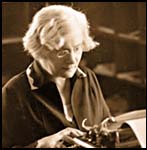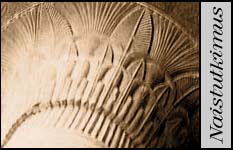




WOMEN OF LEARNING: NAME INDEX | DISCIPLINES | PERIODS | FIRSTS | THE INVISIBLE
LANDMARKS | FACTS | WOMEN'S STUDIES | FRONT PAGE

 |
Science is sometimes defined as a way of seeing things. Women still
far too often constitute a "blind spot" in the vision of the scientific
community. Veronica Stolte-Heiskanen in Women in Science - Token Women or Gender Equality (1991).  Women's Studies has its roots in the women's movement, with its claims concerning social and cultural gender inequality and misogyny, as well as in the recognition of the experiences and views of women as a foundation for new knowledge. Women's Studies have progressed from pointing out and theorizing about these issues toward deconstruction and critical reappraisal of the very concept and significance of gender. Gender differentiation is seen as a socially constructed and culturally embedded way of organizing the division of power and resources in society. In addition to gender differentiation, differences and inequality between women are also examined. These include sexuality, class, ethnicity, and age. Women's Studies have also revealed gender biases in traditional scholarship and knowledge, with the aim of developing research in the identification and acknowledgement of gender and gender differentiation. Women's Studies were originally mostly carried out in the humanities and social sciences but later also in other fields such as law, theology and medicine. The end of the 70s and the beginning of the 80s saw a turning point in the history of Women's Studies in Finland. Women students and scholars began to meet "as women" in various university towns. As an example, those interested in Women's Studies formed their own working groups in connection with the annual meetings of scholarly associations representing different academic disciplines. In the 1980s, the budding research in Women's Studies started to receive support in particular from the Academy of Finland and from the Council for Equality between Women and Men (TANE). The Academy and the Council for equality arranged the first national interdisciplinary Women's Studies seminar held in Helsinki in January 1980. The speakers at the seminar were researchers who have played key roles in the development of Women's Studies in Finland. They included Elina Haavio-Mannila, Auli Hakulinen, Raija Julkunen and Päivi Setälä. In 1981, under the auspices of TANE and the Academy of Finland, the post of national Women's Studies coordinator was established. The post became permanent in 1986. During the early 80s, Women's Studies received earmarked funding from the Academy of Finland. In the early 80s, associations of women researchers were founded in most university towns for the purpose of furthering women's status in higher education and promoting research by, on and for women. At the same time, university teachers started to organize first introductory courses in Women's Studies. The first Women's Studies institute in Finland (Institutet för kvinnoforskning) was established in 1986 at Åbo Akademi University in Turku. In 1990, the Women's Studies unit which became the Institute for Women's Studies in 1997 was established at the University of Tampere. The Christina Institute at the Helsinki University was founded in 1991 and the Centre for Women's Studies at the University of Turku in 1995. Both the Finnish Association for Women's Studies and the national scientific journal in Women's Studies, Naistutkimus - Kvinnoforskning, were founded in 1988. Finland's first professor of Women's Studies was Päivi Setälä at the University of Helsinki, whose post, however, was temporary. A professorship for fixed term in Women's Studies was established at the University of Helsinki in 1994. Similar chairs were established at many other universities in the late 90s. At present there are nine Women's Studies professors in Finland, and, with the exception of the University of Helsinki Christina Institute, all of them are thus far financed by the Ministry of Education's project funds. In 1999 the Academy of Finland established an Academy Professorhip in Women's Studies titled Minna Canth professorship after the famous 19th century writer and feminist Minna Canth. The first scholar appointed to this five year term Professorhip is social antropologist Ulla Vuorela. More information on Finnish women's studies: Akka-info |
 |